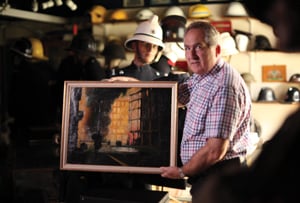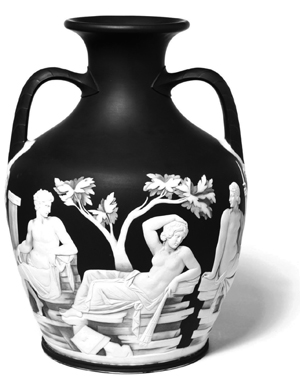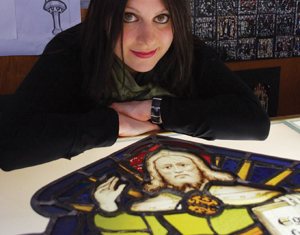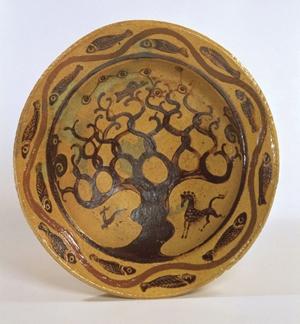A conversation with the BBC
Broadcasting is collaborative. A lot of people are involved in creating it, and many of the best new ideas are born out of dialogue. Mark Bell reveals how arts collaborations come about, and what makes them so effective




The BBC is in continual conversation with the cultural sector, and is always looking for new ways to reflect it. TV and radio programmes are the main output, but the BBC’s relationship to the arts sector goes beyond broadcast. There is direct support for cultural events such as the Proms, backing for literacy and performing arts campaigns through BBC Learning, and partnerships where we bring technical experience to digital projects. I want to take some individual examples of successful pairings between arts bodies and the BBC to shed light on the process and on how the partnership between the arts world and arts broadcasting can work.
Arts institutions provide our programmes with subject matter. We regularly present performance with minimal editorial context, such as the BBC Proms, Glastonbury, opera and ballet, alongside other cultural events such as the recent Frankenstein event on BBC Three (a collaboration between BBC North, Screen Yorkshire and Fresh productions) or the film adaptation of Rupert Goold’s Macbeth on BBC Four last Autumn. This production started life at the Chichester Festival, followed by sold-out runs in London and New York, and was filmed by Goold and the production company Illuminations in a remarkable network of nineteenth century tunnels under a country estate in the Midlands.
Our factual programmes fulfil two main objectives: topical coverage and broader authored programmes that put the arts in a historical and cultural context. The week’s cultural highlights featured on The Culture Show have recently included Gerhard Richter at Tate Modern, English Heritage’s current Heritage Angels campaign and the residents of Comrie in Perthshire commenting on the 2011 shortlist for the Man Booker Prize. There is review and debate about the latest releases on the Review Show, and films on Imagine about newsworthy cultural figures, from last year’s profile of Ai Wei Wei to Grayson Perry as he opens his exhibition at the British Museum. Across TV and radio the researchers on our topical arts strands, as well as our cultural journalists in the newsroom, are always looking for arts news stories.
Neil MacGregor’s series last year for BBC Radio 4 – ‘A History of the World in 100 Objects’ – could not have happened without high levels of trust between the British Museum and Radio 4. Rob Ketteridge, a Radio 4 producer, approached the British Museum Director Neil MacGregor and the Museum’s curatorial expertise was combined with Radio 4’s production skills to give a new narrative context to the 100 chosen objects as touchstones of global history. Partnership in the project extended well beyond London. Museums around the country participated with their own iconic collections, broadcast through local and nations’ radio stations and gathered together on the History of the World website.
Another successful project that involved different outlets across the organisation was World Book Night in March 2011. The brainchild of Jamie Byng of Canongate Books, the initiative brought together publishers, the book trade and libraries in a massive book giveaway, in which 20,000 keen readers were recruited to hand out a million books for free. As part of our partnership, the BBC helped drive the recruitment of 20,000 givers. The event itself was covered on BBC Two and with a night of programmes from The Culture Show and on Radio 4, which also offered an online archive collection of the featured authors.
The Public Catalogue Foundation (PCF) has been painstakingly producing for over a decade a photographic record of the paintings in the national art collection. Three years ago Andy Ellis of the PCF approached the BBC with the idea of putting the collection online. Dan Gluckman in BBC Online developed the site, and in June 2011 we launched Your Paintings, a site initially featuring around 63,000 of the 200,000 or so oils and acrylics that belong to the British public, spread around galleries, storerooms, council offices, and schools, and even including a nuclear bunker, a fire station and a lighthouse. Many of these paintings are being made available for the first time. The site is being regularly updated with new collections being added, and we aim to have the collection complete by the end of 2012.
A season of programmes about paintings, Art Revealed, was broadcast alongside the launch of Your Paintings. This included ‘The World’s Most Expensive Paintings’ with Alastair Sooke, ‘The Impressionists’ with Waldemar Januszczak, and James Fox’s history of British painting from Sickert to Freud, ‘British Masters’. These programmes came about independently as pitches by producers, but we scheduled them together to create a sense of event. These different perspectives on art and art history hopefully encouraged people to make up their own minds, make new discoveries and connections, and go out and explore the rich collection of free art that is available in this country.
‘Handmade in Britain’ a partnership between BBC Four and the V&A, was launched at the end of September. Jonty Claypole in BBC London Arts came up with the idea of doing a series of programmes across a year addressing the applied arts and arranged by material. He approached Damian Whitmore at the Victoria & Albert Museum who embraced the idea and lent curatorial support to it. Richard Klein, controller of BBC Four, also offered editorial backing. ‘Ceramics – A Fragile History’ attracted around half a million viewers to the first episode and has been followed by programmes about porcelain and stained glass. Other materials including metal and wood will be examined in 2012.
2012 will present particular challenges for broadcasters and cultural institutions. The Olympics and the Queen’s Jubilee will occupy considerable energy and airtime. Festival 2012, the culmination of the Cultural Olympiad, is producing and promoting events around the UK and our cameras and microphones will be capturing this extraordinary event for our audiences and for posterity. The BBC is also an active partner in the cultural programme – its contribution will be announced next month.
Our partnerships begin life with a few key people, in some instances myself or the commissioning editor for music and events, Jan Younghusband. Other partnerships may be established by our channel controllers BBC Four – Richard Klein, BBC Two – Janice Hadlow, or through our executive producers of BBC London Arts Production, Jonty Claypole and Basil Comely. Then Judith Nichol and Jane Ellison, who are partnerships managers for factual and audio and music programming, come in to look after the relationship and progress the details. Whatever the size of your organisation, it is likely that there is a way that the BBC can work with you. And we are always on the lookout for new ways to express the amazing cultural life and variety of this country.
BBC outlets
If you have an idea for a stand-alone programme or series, you will need to get a BBC producer or production company involved. Check on bbc.co.uk or get in touch with the programme which you think might be right for advice. The more specific you can be the better your chance of making contact with the right person
• BBC One, Imagine…
• BBC Two, The Culture Show
• BBC Two, The Review Show
• BBC One, The One Show
• BBC Two and Four, Arena
• BBC Radio 4, Front Row , Start of the Week
• BBC Radio 3, Night Waves
• BBC Radio 2, The Art Show
• Books: the Book Review Show monthly on BBC Two, and regular books strands on Radio 4 such as : Open Book, Book of the Week, Book at Bedtime,
The Verb
• Music Programmes: Later With Jools, numerous programmes across the radio networks
• Film programmes: Film 2011, Kermode and Mayo (R2), Back Row (R4)
Tips on working with the BBC
• What is in it for you? Think about what you or your organisation want to get out of working with the BBC
• What is in it for the BBC? If you are looking for coverage think about what programme or strand might be best suited to it.
• Why should the BBC cover it? Is it of national or local interest?
• What is in it for the audience? If you are pitching for an interview slot, consider who might make a good interviewee
• Be honest – if you think that dates will slip or people will refuse to do interviews then it is much better for us to know in advance
• Don’t approach lots of producers with the same arts idea as they will probably all end up coming my way
• Try to be specific and realistic – if your project is of limited interest outside your area then it is probably best suited to local networks
• Think about the timing – what might make a good peg? Is there an anniversary? A renewed interest in the subject? A wider celebration? Try to think of anything that might have a news angle – discoveries, or new theories about an artist or their work.
The BBC has clear guidelines regarding commercial and editorial policy. If in doubt check www.bbc.co.uk or ask for advice
Join the Discussion
You must be logged in to post a comment.